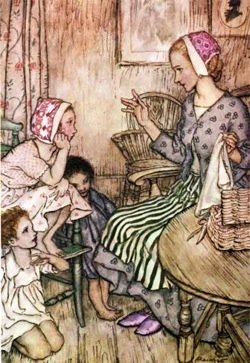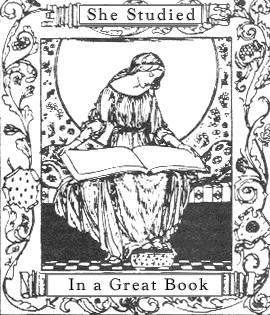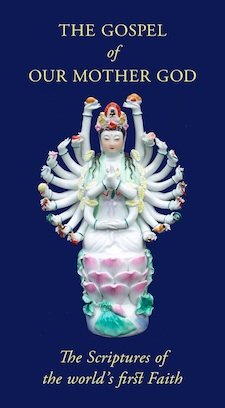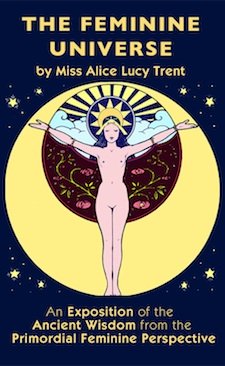The Question
A Tale of Queen Werde

Long, long ago, in old Trintitia, when the world was younger than it is now, though not so young as it had been beforetimes, there lived a noble lady who was beloved of all her people, for that she was most goodly and sweet of nature. Strict she was and just, yet she had a good word to say for every maid no matter what her faults.
Also she was most free with her riches and would allow none to suffer hardship so long as she had power to prevent it. Now as it came about, this lady, even in the noon and summertide of her life, was stricken by sickness and died. And when the time of her death-feast was come, the skies rended them open and the rain fell down until it seemed that the first flood was come upon the earth again.
Now this lady had a daughter even so fair as herself that went by the name of Wisten; and upon the death of her mother, this Wisten was sent to live with an old lady that was as black and sour of disposition as her mother had been bright and lovely; and when, but a year after, she died also, there was none to be sorry for it. But upon her death-feast came the fairest and most glorious three days that ever Sai Raya breathed out of her breast.
Wisten was much perplexed by this. "Is there no justice in the heavens?" she cried. And she made an avow that she would not sleep three nights in the one bed, nor eat three meals off the one board until she had discovered the meaning of this matter.
So off she set upon her travelling. She went a long way and she went a short way, up mountains and down valleys, until she came to a humble cottage with an old maid sitting outside. A maid so old is like to be wise, thought she, and so she reverenced deeply unto her and asked of her the question that occupied her thoughts.
"Nought do I wit of that," replied the maid, "but sithen it is so wide that thou do wander, it may be that thou can find the answer to another question also. I was once a very rich merchant maid, but although I have worked both hard and diligently all the days of my life, I am now as poor as the greatest idler of the town. Canst thou find why this may be?"
"Most surely, if I may I shall, ma'am," replied Wisten, and took up her way again.
She went a long way and she went a short way, up mountains and down valleys, until she came to a fine and well-wrought house and a maid of middle years sitting without; and she asked her question of this maid.
"Nought do I wit of this matter," she replied, "but sithen it is so wide that thou do wander, it may be that thou canst find the answer to another question also.
"In my kitchen is a great fireplace, yet no fire hath ever burned therein. I have used timber and tinder and every manner of matter; I have cleaned the stones and swept the chimney and have hired the very best of servant-maids, but no fire will ever burn in that fireplace. Canst thou discover why this may be?"
"Most surely, if I may I shall, ma'am," replied Wisten, and took up her way again.
She went a long way and she went a short way, up mountains and down valleys, until she came upon a most resplendent palace, whose white towers glistered in the noon-day sun. And therewithout she saw a little child, all alone at her play.
"It is said that the wisdom of a little child may sometimes surpass all the learning of the profoundest scholars," thought Wisten, and so she asked her question of this child.
"Nought do I wit of this matter," she replied, "but sithen it is so wide that you do wander, it may be that you can find the answer to another question also.
"I am a princess of this palace, and my sister is the heir to the throne, and she was wont to play with me here in the green woods. But lately she is fallen into a sickness, and though the Queen my mother hath summoned all the physicians in the land and a great number from other lands also, there is none can tell so much as the name of her sickness. Can you discover aught of this?"
"Most surely, if I may I shall, Your Highness," replied Wisten, and took up her way again.
She went a long way and she went a short way, up mountains and down valleys, until she came to a great river that barred her way, as far as the eye could see. So Wisten made herself a raft of logs and branches and managed to push herself across the river with a long stick. A difficult crossing she had of it, and before she reached at last the other side she was well wetted and weary to the very bone, but still she walked onward in hopes to find lodging for the night.
After a time she came upon a fine-looking house whose front door stood wide open and a blazing fire burned upon the hearth. Beside the fire were two inviting chairs, but there was no one there to bid her welcome.
Wisten walked in and sat herself upon one of the chairs, and after a little time there came from one of the inner rooms a full beautiful and elegant lady who greeted Wisten and offered her food and drink. A most excellent companion she proved to be, and the two of them talked late into the evening. At last, seeing that she was tired, the lady showed Wisten to her bed. But tired as she was, Wisten did not sleep, for her room adjoined the main room, and the door between them was left open, and she found herself fascinated by the lady, who sat up beside the fire. So it was that, though she seemed deep in slumber, she was but half asleep, and quickly came full awake when the lady began to move.
She put her hands into the great cauldron that bubbled over the fire, and then did she sink in her arms even up to the shoulder, and at last plunged her whole self within the boiling liquid. When she had boiled for long enough to slay herself nine times over, she stepped out again, as fresh as a lamb in spring.
Then she set up a noose from the ceiling and hanged herself by the neck. For a time she kicked in the air, and then fell still. Wisten thought most surely she was dead this time, but after a time she cut herself down and threw the noose in the fire. Then, with that same knife, she stabbed herself to the very heart, so that dark blood spread out across the front of her dress, and she fell prone upon the floor.
This time Wisten thought there was no doubt but that she had slain herself. But after a little time she rose up fresh and clean, and threw a velvet cloak over her shoulders, trimmed about with fur, and walked about the room as one issuing commands.

After this, she put on a white robe and began to study in a great book. Then she came through the open door unto the room where Wisten lay, feigning to be asleep.
"Dost thou sleep, or dost thou wake?" she asked, but Wisten answered nothing.
"I know well thou wakest," said she. "Now arise thee up and thou shalt have the answer that thou seekst."
Wisten arose.
"Hast thou heard tell of Werde, Queen of Destiny?” asked the lady.
"Aye, full oft have I" replied Wisten.
"I am that Werde," quoth the lady. "Marked thou the time that I lay in the cauldron? Every babe born in that time shall have such a death.
"Marked thou the time that I hanged by the neck? Every babe born in that time shall have such a death.
"Marked thou the time that I lay bleeding upon the ground? Every babe born in that time shall have such a death.
"Marked thou the time that I was dressed in velvet and fur? Every babe born in that time shall have such a life.
"Marked thou the time that I studied in the book? Every babe born in that time shall have such a life."
Then Wisten asked the question she had come so far to discover.
"Your mother," quoth Queen Werde, "was a fair and good maid. Her life was full of goodness and empty of illness. All the purgatory she had for her sins lasted but those three stormy days of her death-feast.
"The old lady was a close-fisted, cheerless, dishonest and miserable maid. All the good she earned in her whole life was those three days of sunshine at her death-feast.
"You may tell the old maid that when she was a rich merchant many poor beggars came to her door and she did turn them away with curses and no charity. Not until she shall give away even what little she hath now will her fortune be restored. You may tell the maid of middle years that the stones of which her hearth is built were bought with money made by usury of poor farmers that had suffered three bad harvests. Not until all the money is returned will a fire ever burn in her hearth.
"You may tell the little princess that not all the worldly doctors upon the earth can ever tell the name of the sickness, for it is a sickness of the spirit. Her mother has taught her not the ways of Truth and the love of Dea, and how may a queen lawfully rule that knoweth not these things? Let her be taught and quickly she shall be well. Fortunate they whose sickness of the heart becomes a sickness of the body in this life, that it may be amended before the death."
Then Queen Werde gave Wisten three brazen apples, saying: "I shall direct thee to a bridge across the river, else thou shall never come home alive, for the way shall be guarded by the old maid to whom thou went after your mother’s death, in the form of a three-headed wolf.
"When thou see her, thou must throw one of these apples into each of her mouths. If thou miss, she will surely devour thee."
When she came to the bridge, Wisten met with the terrible and demonic form of the old maid and she was seized with terror, but she threw each apple neatly into each mouth and got herself across the bridge just a heartbeat before the wolf had swallowed them and was after her again, but once across the bridge, her pursuer could follow no further.
She told each of the people that she met on the way what Queen Werde had told her to say.
The old maid gave away all the little she had left in the world, and within a month one of her ships, thought lost at sea these many years, returned, laden with silks and spices. And when she was rich again, she sent to Wisten a silken gown every year of her life until she died.
The maid of middle years gave to the poor farmers all that she had taken and more, and soon a bright fire was blazing in her hearth. She gave to Wisten the finest white mare in the western world.
The princess's mother had her child instructed in the ways of Truth and the love of Dea, and before long she was playing with her sister in the green wood again.
The Queen was so pleased with Wisten that she adopted the orphan girl as her own child, and when she was of age, she gave her the half of her realm — for who could be better able to rule a realm than the maid who had talked with Queen Werde herself?
COMMENTARY
This story can be read on more than one level. At its simplest it teaches certain important lessons about the nature of werde.
The question that prompts the whole quest, and its answer, make clear that things are not always what they seem. What appears to be injustice, in the ultimate scheme of things, in fact never is; and conversely, we may never assume that a person is bad simply because she is having bad fortune. It is true that bad luck can only be the result of evil deeds, but there may be more to matters than meets the eye.
Also, as Queen Werde says, bad luck in this life may be a good fortune if it leads us to seek out the underlying spiritual causes and put them to rights.
The deaths and lives portrayed by Queen Werde on the one hand, and the answers to the three maids' questions on the other, show the two complementary aspects of personal werde – in some respects it is fixed and ineluctable – an inescapable fate laid down for us by our own actions in previous lives. In other respects it is a process of becoming which we can alter if we will learn its lessons and act upon them.
On another level, the story deals with the other-world journey which is an essential element of the initiatic path.
The significance of crossing the river is clear in the light of the symbolism of the the Bridge (to which we shall devote an article). We may note that this tale is a close cousin to "The Devil’s Ferryboat", a folktale known throughout Europe under various names, which concerns the descent into the inferior psychic regions in order to gather the scattered fragments of the soul (a theme discussed in detail in "The Secret of the Three Caskets".
The two aspects of the story (moral and metaphysical) are closely united in the incident of the three-headed wolf. On the one hand the old maid has taken on a demonic form in after-life as a consequence of her wickedness during life. On another she is now one of the "guardians of the gateway" which bar the path and test the qualification of the aspirant on the initiatic path. For her werde is to be defeated by Wisten, and Wisten's is to cross the Gateway.
See also:
Mythology and Folklore: the deeper meaning of fairy tales
Frau Holle: The Supreme Mother God in Folk-Memory and Fairy Tale Tradition
Mother Holle: or Cliona and the Three Caskets – a traditional fairy tale containing much ancient metaphysical doctrine.
The Secret of the Three Caskets: An in-depth metaphysical commentary on the above story.
Send Questions or Comments on The Question
Chapel of Our Mother God Homepage
All written material at the Chapel of Our Mother God is copyright. Should you wish to reproduce any portion please contact us for permission.
YouTube or Facebook
This section:
Stories and Symbols
Gospel of Our Mother God
The Gospel of Our Mother God is a collection of inspirational texts, prayers and daily inspiration for the Mother-Faith devotee or household.
The Feminine Universe
The Other Philosophy
Everything you have ever heard comes out of the patriarchal world-view. Its materialism, its religion, even its feminism. Here is the other way of seeing the world; the natural way: the way that everyone saw things before patriarchy and will again when patriarchy is long forgotten.
Visit the Sun Daughter Press Reading Room

